Footsteps Through Time | Home
The War With King Philip | The French and Indian Wars | The Revolutionary War | The Civil War | The Dakota Territory | The World Wars
The Revolutionary War
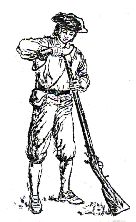
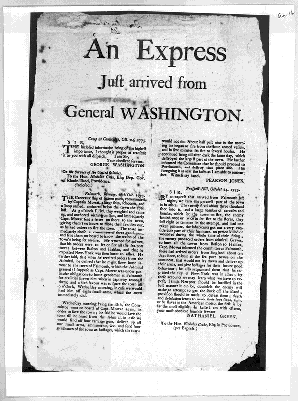
Rehoboth Militia
After the Declaration of Independence was signed in 1776, young men of New England were eager to fight for liberty. They had been oppressed long enough. These young men were able marksmen and hunters. They knew their lands well and were not about to lose them. Their families had worked too hard to establish these farms. The citizens were being drained by excessive taxes. The British government had levied heavy tariffs on tea, nails and cloth and pins. All the necessities of life had to be imported from England at exorbitant prices. England ruled with a heavy hand.Rehoboth prepared for war.
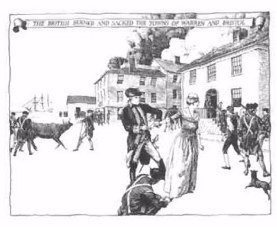
British Troops in Bristol, Rhode Island
As war with England approached, young Joseph Cole trained on the new field set aside for that purpose in Rehoboth. His brothers, William, Thomas and John also honed their skills. Although the Cole brothers were needed on the family farm, Joseph was called upon four times from December 12, 1776 to August 8, 1780 to serve the cause of the Colonials.
On December 8, 1776, he enlisted in Captain James Hill’s Company, Col. Carpenter’s Regiment from Rehoboth. They marched to Bristol, RI for twelve days service. Governor Cooke wrote to General Washington that “seventy-eight British ships of war and transports entered the harbor yesterday.”
One contingent of men landed at Newport, but the main body of British troops landed at Coddington Cove and after a night of pillage, marched in three directions; toward Bristol Ferry, toward Newport and to Howland’s Ferry where the soldiers were just in time to fire upon the militia men who were leaving the island. On December 9, 1776, some of the Americans who left Aquidneck Island assembled at Tiverton and Bristol to begin observing and harassing the British.
Citizens of the eastern shore of the bay decided to protect themselves and their property by maintaining guard duty from Howlands’s Ferry to Sakonnet Point. Five guard houses were set up, and patrols were maintained throughout the long occupation. The same procedures were established on the western shore of the bay.
On April 19, 1777, Joseph went with his unit to guard the lines at Rhode Island for two months. At that time the British were building forts at Fogland Ferry and Butts Hill in Portsmouth.
Joseph donated money to raise Continental Soldiers on February 18, 1778. He marched again to Tiverton, RI on July 28, 1780 to stand guard for six days. Joseph earned the rank of Corporal in the American Militia.
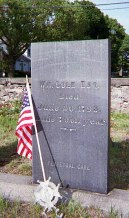
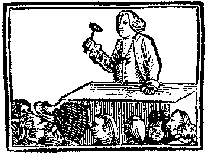
As problems with Britain escalated and war with England became inevitable, William served on a Committee of Correspondence, petitioning the Royal Governor for relief from excess taxation and arbitrary and unjust rules and regulations. He became a leader as the town prepared for war. Meetings were arranged to obtain weapons and cannons. Militias were formed, military tactics planned, and farmers and tradesmen trained for war. They had enough of British rule. A new country was being born, and William was in the thick of it. Four of his sons served in the Revolutionary War, Joseph, our ancestor, Thomas, William and John.
Text of a letter sent to the General Assembly of Boston on May ye 25th 1773:
"To Capt. Joseph Barney Representative for the Town of Rehoboth."
Sir,
It is Evident fromt he repeated Suffrages of the Freeholders and other Inhabitants of this Town that your Late Conduct in the General Assembly of this Province has met with a favourable Reception - with Pleasing hopes & Expectation we trust you will in this day of general oppression and Invasion of our Natural & Inherited Rights & Liberties Join in Every solutary & constitutional Measure to Remove those unconstitutional Burdens & Greviences that this Province and America in general have long & Justly remonstrated against: Never the less we think it our Duty to express our Sentiments in Regard to the Encroachments made on our Rights and Liberties as stated by the worthy Inhabitants of the Metropolis of this Province whose Loyally Vigilance & Patriotic Zeal in this Time of Common Danger has not been Equalled in the Present nor exceeded in some time; & of which we have the highest opionion & shall Ever acknowledge with gratitude the Particular of which we do not think Expedient to enumerate But refer you to a Pamphlet ( for your careful Perusal ) sent from Boston to this and to every other Town in the Province which ( upon the most careful and critical Examination ) we humbly conceive very Justly state our Right & Priviledge as Men as Subjects & a Christian and the unparalledled Encroachments made on them by a MInistry who fond of arbitrary sway in open Violation of the most scred contrast & agreement: Entered into with our Prediecessors the Patantees of this Province and Solomnly Ratified by King William & Queen Mary Have hitherto with Impunity Profanity violated the faith & Promise of a King on whose Royal wand we made the most firm & indubitable Deliance and involved this Province and Contonant in the utmost Distress & calamity & into consequences have Deeply affected the Parant State whose Prosperity & happiness we have Ever Considered as Near & Dear tous as our own and it now is and ever has been our Earnest Desire & Prayer that ther Never May be wanting one of the Illustrious Houseof Hanover to Sway the Scephe of Great Britain & America in Rightioness so long as the Sun & Moon shall indure.
We your Constituents Desire & Expect that you Exert yourself to the utmost of your ability not only to serve our Remitting Priviledges inviolable but to obtain a full Redress of all those many grivances so Justly complained of a full Restoration & Confirmation of all the Rights & priviledges we are Justly Intitled to by Nature and the Solomn Compact afore Said that generations yet unborn may know that this Town have not been Dermant while the Enemies thereof have been vigilant & active to wrest from them Every Priviledge & Blessing that Renders Life worthy of Injoyment.
"We trust you will be vigilant even among your Brethren Lest some of them there sinister Views or ambitious Designs be enduced to Barter away & betray our Dear bought Priviledges & and Liberties together with this our paternal Inheritace. Established with so much Trial and raised to such a Height of glory and Transmitted Down to us at no less Price than the Blood & Incasine of our Ancestors. Thus we hope & Presume there will not be found a man as that august assembly so abandoned so profane so antheisiatic so mad as to Disturb the Repose of the Pious Dead & bring upon himself not only the Just Indignation of all the Virtuous But the Ire of that Dread Sovereign beneath whose awfull frown audacious & their Minions Tremble.
We Present these Hints to your Judicious considerations and wish that not only you but all true friends to the English Constitution may be guided in the Path of wisdom & Equity and Never be Directed from the Steady Persuit of the true Intrust of yourselves your King your country & Posterity.
The above is Respectivities offered to the consideration of the Time by their humble Servants.
Ordered that the Town Clerk Record the above Proceding and Deliver in Attested copy of the same to Capt. Joseph Barney as soon as may be conveniency -"
"Voted that our Committe of Correspondence transmit to the Committee of Correspondence at Boston as soon as may be with the whole Transactions of this Town so far as Relate to our Common Intrust & Danger with the Thanks of this Town for their Vililance & Care in our Common concern & for the Particular account transmitted to us of the Innovations made on these Right we are Justly Intitled to by Nature & the Charter of this province.
The above is a true Copy of the Transaction of the Town of Rehoboth.
Voted that Mr. Nathan Daggett he being absent on a Journey.
Attest Jesse Perin Town Clerk.
Rehoboth May ye 25th 1773
Thomas Carpenter Esq.
Ephraim Starkweather
Nathan Daggett
John Lyon
Joseph Bridghem
William Cole
Committee of Correspondence
Two years later:
The news of the British attack at Lexington & Concord was quickly carried from town to town by messengers on horses. As soon as Rehoboth townspeople received the alarming news, the town immediately sent five companies of Rehoboth Minute Men. The Minute Men companies marched from Rehoboth on the evening of the same fateful day of April 19, 1775 to assist the Colonial Militia at Concord and Lexington against the British troops They arrived too late to assist in these two battles.
November 6, 1775 Town Meeting:
"Likewise voted to Borrow four Peaces of Cannon of Capt. John Lyon and Mr. Nathan Daggett instead of Borrowing them of the Town of Providence.
Chose Mr. Nathan Daggett, Capt. John Lyon, Lt. John Ide, Capt. Phanuel Biship & Mr. William Cole & committee to gitt the Cannon Mounted on Carriages at the Town Charges and Provide Stones and what Else shall be wanted to make them fit for Service.
Likewise voted to raise the sum of £60 to defray the charges of mounting said Cannons and to Provide Aminition and other utensiels that shall be Needfull for the same."
"Also chose Mr. Nathan Daggett, Capt. John Lyon, Lt. John Ide, Capt. Phanuel Biship & Mr. William Cole a committee to wait on the Committee of the town of Providence to sonsult on fortifying Hog Pen Point (Fort Hill, East Providence) and make Report to the Town at the Adjournment of this meeting."
Voted £60 to be added to the Town Tax this present year.
Voted to Except ( Accept ) of the Committee Report following:
We the Subscribers being a Committee appointed to meet the Committee of Providence in order to come into measures of Intreching or Makeing a fortification ath hog pen point we accordingly meet them and Judge it an advantage Place to fortifye to Secure the River.
Also voted to give Leave to fortify at Hog Pen Point to keep accounts of the work that Every Person Doth at said fortification.
John Lyon
Nathan Daggett
William Cole
Phenuel Biship
Comitte
Fort Hill was fortified to guard Hog Pen Point. This fort commanded the Seekonk River and approaches to Providence. Kettle Point on the east side was also fortified with two nine pounders. The mouth of the river was closed to hostile vessels by a chain and boom attached streched across the river between Field's Point and Kettle Point on the east side. A breastwork was also built on Bullock's Point for local soldiers to stand behind and prevent the British from landing there. This was part of Barrington. Hog Pen Point fortifed November 1775.
Likewise
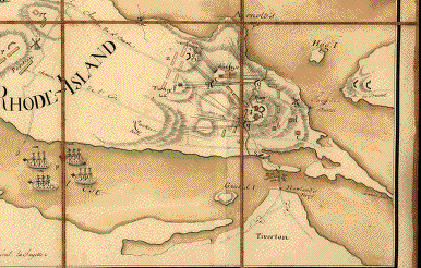
Guarding the Line at Tiverton, Rhode Island
British Troops occupy Newport and Portsmouth, RI. They pillage and burn several buildings and boats in the town. Refugees from the island pour into Providence for fear of their lives. In August of 1777, the British raid Narragansett. The frigate Rose raids Block Island that same month. Rhode Island sends for reinforcements from nearby Rehoboth, MA.
It is the same year General Burgoyne is defeated at Saratoga,NY and General Washington settles in for a harsh winter at Valley Forge.
During the American Revolution, John was not a young man. He was in his fifties.John served the cause of the Colonies by being sworn into the Militia in 1777. He served as a Private in the Company of Captain Samuel Cowell. This company served in Col. Benjamin Haw's regiment of Rehoboth, MA. John took part in a secret expedition from September 23 to October 30, 1777. The Roll Call was taken in Suffolk County.
This mission was a plan for a general attack on Newport, Rhode Island, under the direction of General Joseph Spencer. The goal sought was for 10,000 men to gather for this battle. By October 13, only 8,333 men were counted, John being one of them. Later, a decision was made to mount an attack if the muster revealed 6000 men available, but the count on October 28 was only 5000 men, and the plan was called off. John remained the entire time. Perhaps other's left, as it was harvest time, and they may have had to return to their farms.
John also contributed money to raise Continental Soldiers on February 18, 1778. His son Levi, our ancestor, also served in the
Rehoboth Militia. He joined when he was only fifteen.
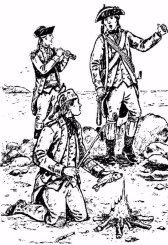
Guarding the Shore in Rhode Island
Levi often heard his father and older brothers talk about how relations with Britain were becoming progressively worse. There were more and more restrictions on trade, and taxes had more than doubled. The people of Rehoboth were very much aware of the growing friction between them and the mother country.
In the year of 1776, the Colonies signed the Declaration of Independence. It was evident the colonies had set their minds on revolt. And then the shots were fired at Lexington. Rehoboth sent a contingent. Young Levi Daggett was fifteen years old. His older brothers, Joshua and John and his father were busy with their farm chores and planting, and training on the town common with their hunting rifles, ready to defend their home. His father joined Captain Sam Cowell's Co, and served in Col. Benjamin Haws' Regiment. Anxious to do his part, he joined Captain James Hill's Company. It was part of Col. Carpenter's Regiment from Rehoboth, MA.
Levi enlisted on December 11, 1776. His first service was for a period of thirteen days. His unit marched to Bristol on an alarm.
He was next drafted for three months to guard the shores at Rhode Island on December 29, 1777. He then served as a Private in Captain Joseph Franklin's unit from Rehoboth in Col. John Daggett's Regiment. Col. Daggett was a cousin. His enlistment in this unit was on January 1, 1778. Levi served for three months and was discharged on March 31, 1778. He had been on duty in Rhode Island. He was then seventeen.
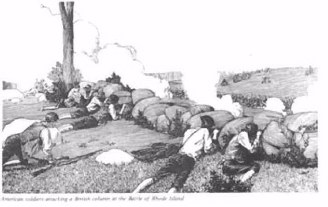
American Militia Men at the Battle of Rhode Island
As tensions increased between Britain and the colonies, Comfort and his sixteen year old son Comfort, Jr., trained with the Rehoboth Militia. After shots were fired in Lexington, conditions grew worse. On December 8, 1776, an alarm was sounded calling for troops from nearby towns to assist the people of Bristol and Newport, Rhode Island. Private Comfort Peck marched in Captain Joseph Franklin's Company, Col. Thomas Carpenter's Regiment to Rhode Island. His unit remained there for eight days.
Excerpts from the book "Once Upon a Time in Rhode Island"
"It was the year 1776, and the war with England had begun. Along the roads sounded the rumble of artillery and the tramp of armed troops.
In December, a squadron of British vessels sailed into Newport Harbor; the troops landed and took possession of the town.
On the mainland people were terrified lest the British should come there, too. Those living near the coast were advised to send their women and children back into the country for safety, and their furniture and cattle as well. For a time the roads were almost blocked with loaded carts, and with droves of cattle and flocks of sheep. The militia armed and prepared to defend their state, and besides the militia, enough volunteers enlisted to make a full regiment themselves.
Messengers were hurriedly sent to the other New England States to ask for aid, and Massachusetts and Connecticut almost at once sent troops. It was indeed very important for all of New England that Rhode Island should be protected. Rhode Island had sixty miles of coastline, at any point of which the British might land unless there were troops to defend it, and her shores were like an open door to the rest of the country. "
The second time Comfort Peck was called to duty was his service as a Private with Captain Israel Hix's Company, Col. Josiah Whitney's Regiment. Comfort served from July 30 to September 10, 1778 on an expedition to Rhode Island.
More excerpts from the book "Once Upon a Time in Rhode Island"
"On July 29th (1778) a number of sail were sighted on the horizon toward the southeast. The people on the island hurried to the cliffs on the seaward side, and stood washing eagerly the approach of the vessels. It was impossible, however, to tell what vessels they were even when they came near, for they showed no flags. They might have been either British or French.
By one o'clock the fleet had reached the mouth of the main channel, just off Point Judith, and here they dropped their sails and came to anchor. It was a magnificent site as the great vessels lay there rocking gently to the long swell of the water. There were twelve ships of the line, four frigates, and a corvette. Suddenly there was a flutter of white at the mastheads. The flags were being run up. A moment later they lifted in the wind, and all could see the Three Lilies of France on their white ground. It was the French Fleet, our allies, and the heart of the Americans rose high with hope as they saw those flags of the friendly nation.
The day after the arrival of the fleet, the American General Sullivan went to the flagship to talk over the plan of attack with D'Estaing. It was decided to make the attack as soon as possible. To wait would only be to give the British a chance to strengthen their position still further. The American forces were to cross from Tiverton to the north end of the island. The French troops were to land on Conanicut Island ( Jamestown) and to cross from there. Meanwhile, two ships of the line, two frigates, and the corvette were to take up such a position as to keep the British ships that were in the harbor from escaping.
The movements of the French fleet were carefully watched by the British. They soon realized that their vessels were being shut in by the French, and rather than run the risk of having them captured, they destroyed them. Three vessels that were in Sakonnet River were blown up. Four frigates and the corvette were run up on the beach of Rhode Island and burned. Others were burned in the harbor, and the hulks were sunk there so ass to obstruct navigation.
The 10th of August was the day set for the French and Americans to land on the island. Sullivan's forces had grown until now he had under him almost 10,000 troops, but he most of these were raw and untried, and had never been in battle before. Almost all of the British were veterans. However, the French, too, were tried troops, an Sullivan counted largely on them. He was full of hopes of success.
But a bitter disappointment awaited him. The French troops were landed on Conanicut as he and D'Estaing had agreed, but hardly had this been done when a British fleet was sighted down the bay. D'Estaing at once decided to re-embark his men and sail down to meet the enemy and give battle. His troops were ordered back to the vessels, and as soon as they were on board he set sail. Sullivan knew nothing of this sudden change of plan. He was still counting on his allies, when looking out over the water, he saw with amazement, that the French fleet was disappearing in the distance.
The disappointment was so great that a feeling of discouragement spread through the whole army. Men and officers alike began to doubt whether the French were faithful to them. Lafayette was deeply mortified.
But in spite of the desertion of the fleet, Sullivan determined to carry out his attack. But, on the 12th of August a great storm arose that swept both land and sea. The wind blew a hurricane, and the rain fell in torrents. Arms and ammunition were made useless. It would have been impossible even for troops to march in such a storm. Tents were blown down or carried away by the wind. The soldiers were left without shelter. They crouched in the corners of fences or against rocks, trying in vain to protect themselves. Many died from exposure.
On the sea the fleets were scattered almost before their battle had begun. Masts were broken and rigging torn away.
By the 15th the storm had passed, and during that day the French fleet again came in sight and took up the position they had before. Sullivan hoped now, at last, they would carry out their agreement. Instead D'Estaing sent him a message that he would have to sail to Boston to have his vessels repaired. It was in vain that Sullivan urged and entreated him to remain. Lafayette added his entreaties to Sullivan's, but the French admiral was determined to go to Boston. He would promise nothing except that he would return as soon as possible, and with despair Sullivan saw the sails set and the whole fleet go sweeping out past the British batteries and away toward the north.
The second desertion by the French had an even worse effect on the American forces than the first. They began to desert in large numbers. Almost 3,000 of them left and went back to the mainland, and Sullivan's force of 10,000 was reduced to 7,000.
He still held a place on the island, but with such a weakened army, he dared not stay so near the enemy, and he retreated to the fortified hills at the north. He hoped it would not be long before the fleet returned, but meanwhile his heavy stores and baggage were sent to the rear where it would be easy to transport them to the mainland if this proved necessary.
By the 28th the last of the heavy baggage was carried to the rear. All was ready for a retreat, but still Sullivan waited, hoping each day that the French fleet would return, but each day he was disappointed.
On the 28th Lafayette started for Boston to try to hasten the return of the fleet. He crossed to the mainland and then made the journey on horseback. He was so eager to return that he made the whole journey ( a distance of almost seventy miles) in less than fourteen hours.
The British had learned, with fresh hope, that Sullivan was making ready to retreat to the mainland. They determined to make an attack at once, and before his forces could leave the island.
Very early, almost with the dawning of the 29th, the British forces were on the march, and at nine their cannon opened fire on the American outworks. The heavy booming seemed to shake the island and could be heard on the mainland.
There were two principal highways along the island, one to the east and one to the west. Along these roads the British columns moved to the attack. The Americans had made ready to meet them. Two light corps had been sent out, one down the east road, and one down the west road, to meet the advance of the enemy.
A number of pickets were stationed at a crossroads that branched off from the east road. Here a field had a stone wall around it. The order for these pickets was to lie concealed behind the wall until the British were close upon them, and then to fire on them and retreat. This order was well carried out. The light corps, when attacked, fell back to the main body of the army. The order to do this was brought to them by a regiment that Sullivan sent to protect the retreat. The pickets still crouched concealed behind the stone wall. The field lay still and peaceful in the sunlight. For a time the pickets heard nothing but the distant roar of the cannon, and the nearer volleys of artillery. The American troops had fallen back. Then from down the east road came the steady tramp of the British as they came swinging on, their bayonets glistening in the sunlight.
When they reached the crossroads there was a sharp command from their officer, and the Twenty-second Regiment divided. One half of it continued along the main road, the other turned off toward the field where the Americans were concealed. Pickets still crouched there, gripping their guns and scarcely breathing. Not until the British were abreast of them did they move. Then they sprang to their feet with a yell, and poured a fierce volley in among the red coats.
The British were so utterly unprepared that they made no attempt to return the fire. Many of them had fallen and lay groaning in the dust of the road. Before those who were unhurt could recover, the Americans had reloaded, and had again poured a storm of bullets in among the enemy. Almost one quarter of the whole Twenty-second Regiment lay there, dead or dying.
Two troops of Hessians hurried on to the support of the British, but they arrived too late. The Americans had already gone. They had retreated to the main army without the loss of a single man.
Along the west road the fighting had been hot and furious. Twice the British and Hessians had charged upon the American regiments, and twice they had been driven back. A third attack might have had a different ending, for the American forces were almost exhausted, but two fresh battalions were sent forward by Sullivan and saved the day for them.
Varnum's regiment of Negroes had been posted in a valley. It was against these that the Hessians made their fiercest attack. Three times they charged down the hill, and three times they were driven back. Though many of the blacks were killed or wounded, they had no thought of quitting their position. But the Hessians had suffered far more terribly. So many of them were killed, indeed, that the next day their officer refused to lead them. He was afraid they would shoot him for making them lose so many men. The whole battle had been a slaughter for the British forces. At one place as many as sixty Hessians were found lying in a heap together.
The British were forced to fall back, and the Americans pursued them hotly almost up to their fortifications. One of their batteries on Quaker Hill was captured.
Sullivan was very anxious to carry on his attack still further, but his men were too exhausted. For thirty-six hours they had been on the march, or fighting and working, without a moment to rest or eat. He was obliged to fall back to his camp and allow his troops some time for food and sleep.
On the 30th Lafayette returned from Boston, exhausted from his journey. He was bitterly disappointed when he found the battle had been fought while he was away, and a victory won. Through all that day there was some firing between the two forces, but no regular attack by either side.
Lafayette had brought a letter to Sullivan from the French admiral. In this letter D'Estaing told Sullivan that his fleet was still undergoing repairs, and that he would not be able to return for some time. Sullivan also, that same day, received a letter from Washington warning him that the British fleet, under Lord Howe, had sailed for Rhode Island, and might arrive there at any time.
This was serious news for Sullivan. If the British fleet arrived while he was still on the island and the land forces again attacked him, it would mean an utter defeat of his forces, and a heavy loss. It was now very necessary for him to retreat to the mainland as quickly as possible.
To deceive the British, and make them think he still meant to hold his position, he had a number of tents brought forward and set up where the British could see them. He also sent his men to work fortifying the camp. While this was going on at the front, his stores and baggage were being quietly sent down the river. Lafayette had missed the battle, but now he could do a good service in helping on the withdrawal.
There was, fortunately, no moon that night. As soon as it was dark the Americans were on the move. In perfect silence troop after troop marched down to the river and embarked, and were carried over to the mainland. What was left of the stores and baggage were taken with them. It was a masterly retreat. All was done in perfect order, in perfect silence, and without a single mishap.
All night long the British sentries paced back and forth, giving the sign and countersign, and never once did they guess that the enemy they were guarding against had left the island; that their fortifications lay empty and deserted. Only as the morning light spread palely over the island did the British see that no one was left in the American camp. The enemy they had still hoped to capture had escaped them. They still held the island, indeed - in that far Sullivan had failed-but their forces had suffered a heavy defeat. They had lost 1, 023 men in the battle, while the loss of the Americans was only 211.
Congress passed a vote of thanks to Sullivan for the way he had managed the campaign. It also passed a resolution in which it said his retreat had been "prudent, timely, and well conducted." It was indeed a brilliant end to a brilliant victory, and Lafayette declared the Battle of Rhode Island to be the "best-fought action of the war."
The Women Who Waited
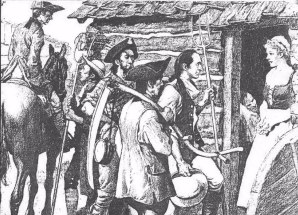
Molly Greenwood Cole
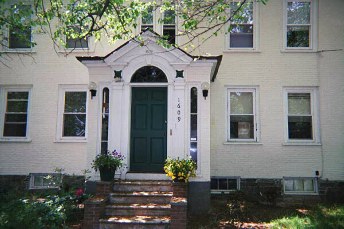
The Cole Homestead
Molly Greenwood was born on July 4, 1729 in Rehoboth, MA, " a little before sunset" according to her father's notes. He was Rev. John Greenwood, pastor of the Congregational Church of Rehoboth, MA. Two days later, Molly was baptized into the Christian faith. She was one of the fourteen children of Rev. Greenwood and his wife Lydia Holmes Greenwood.
On November 26, 1747, at the age of 24, William Cole took Molly as his bride. Revered Greenwood performed the ceremony at the Congregational Church. His bride was eighteen years old. They settled in the area of Rehoboth, MA. William became a prosperous member of the community, a well respected lawyer and public servant.Molly Cole became a member of the Newman Church on July 2, 1749.
Molly and William had twelve children, Rebecca, their first child died at the young age of six months in 1749. Their other children were, Joseph, William, another Rebecca, Thomas, John, Molly, Chloe, Sarah, Bette, Nathaniel and Allen. Four of her sons fought in the Revolutionary War. Molly died five years after her husband in 1798.
Rachel Braley Cole
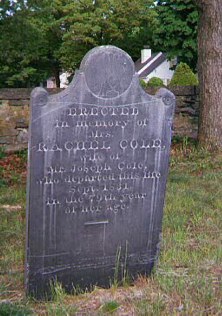
Rachel's Grave in Newman Cemetery, Rumford, RI
Rachel was the daughter of John and Joanna (Alger) Braley. She was born in Rehoboth, MA on April 14, 1747. Three months before the Revolutionary War, Rachel wed Joseph Cole, also of Rehoboth. She was twenty nine. Her husband volunteered for service in the American militia as did two of Rachel’s brothers.
They had seven children, four sons and three daughters. Her first born son, Russell died in 1779 at age three. Several of these Cole children married into the Daggett family. Our ancestor, Joseph married Hannah Daggett.
Rachel died in September of 1831. She is buried with her husband Corporal Joseph Cole in the Newman cemetery in Rumford, RI.